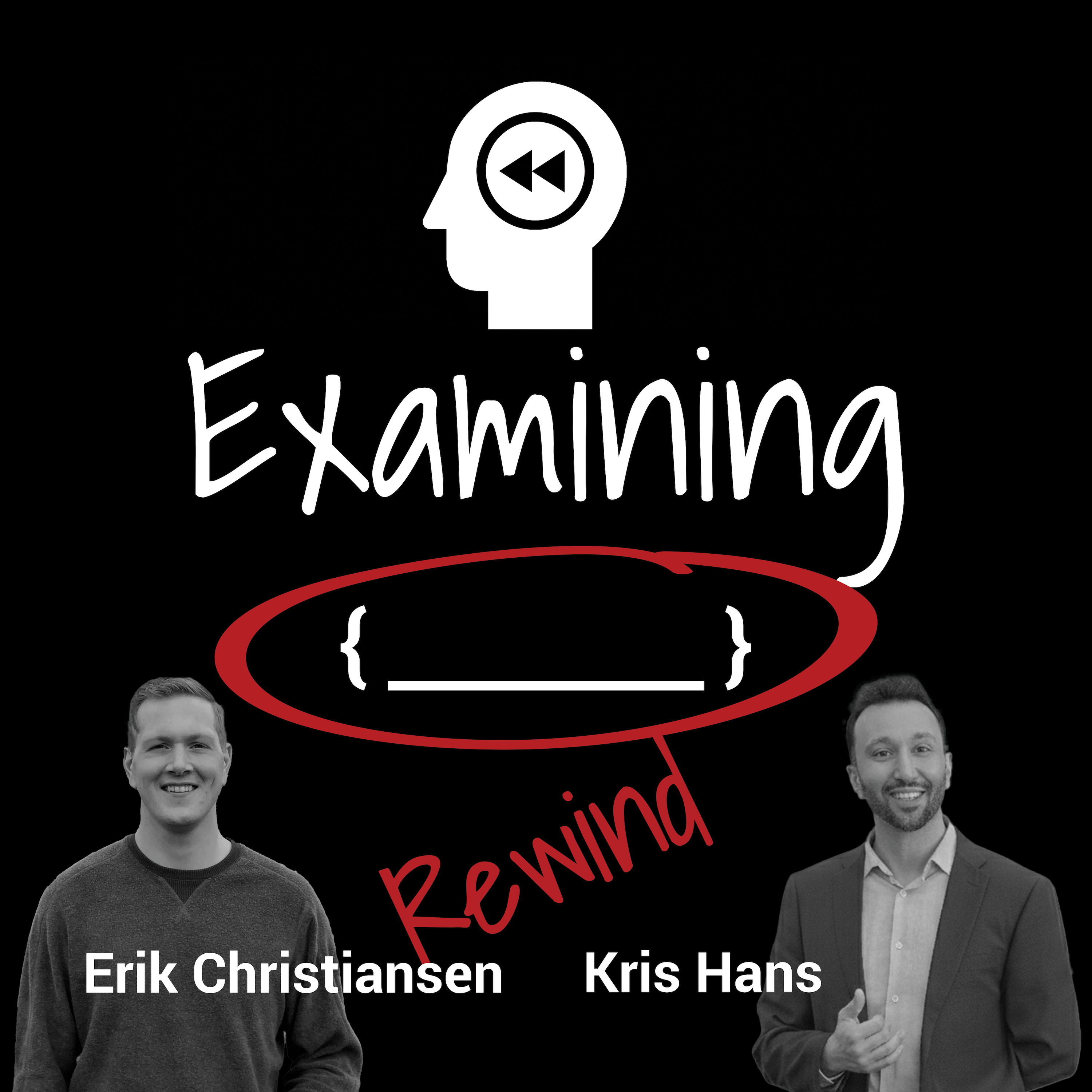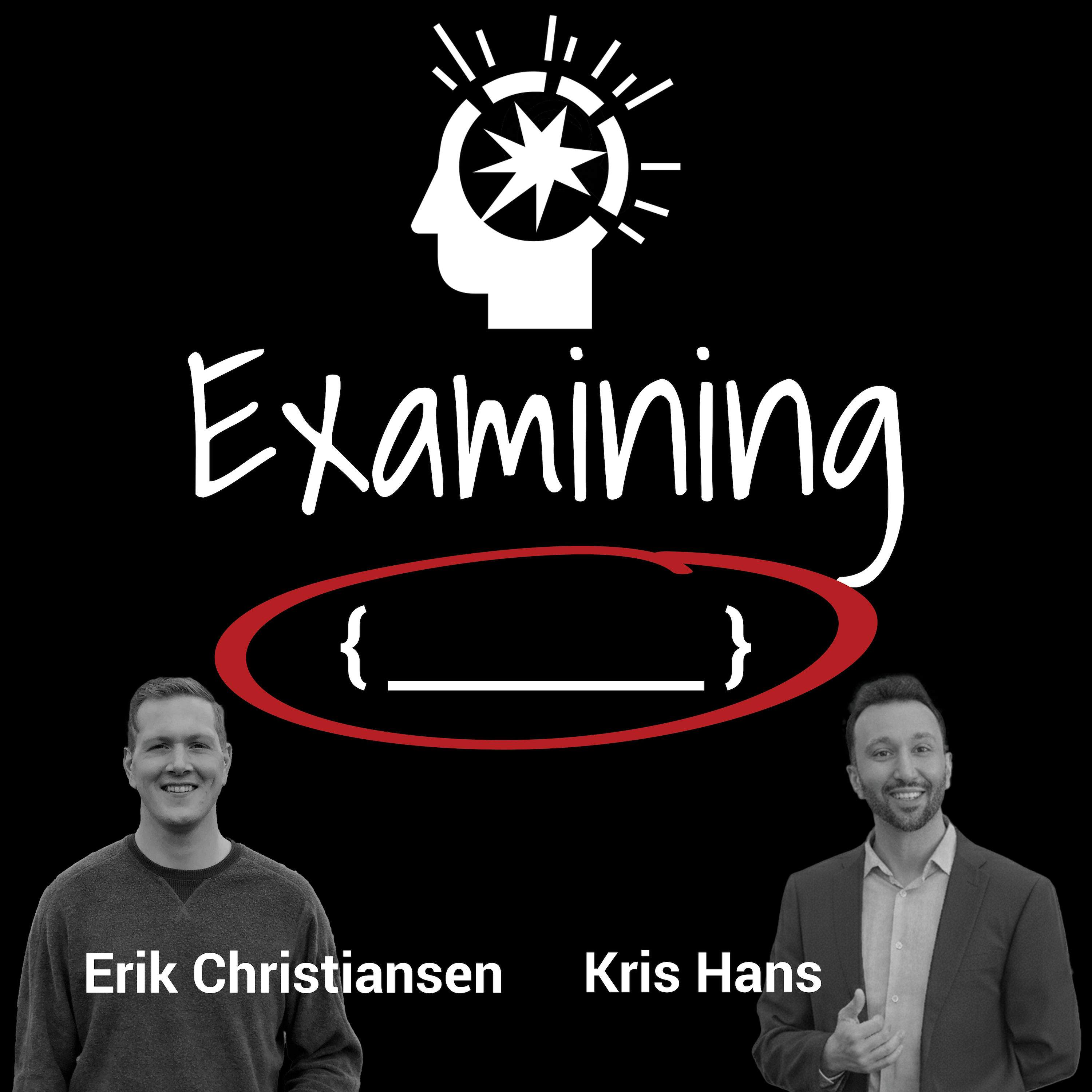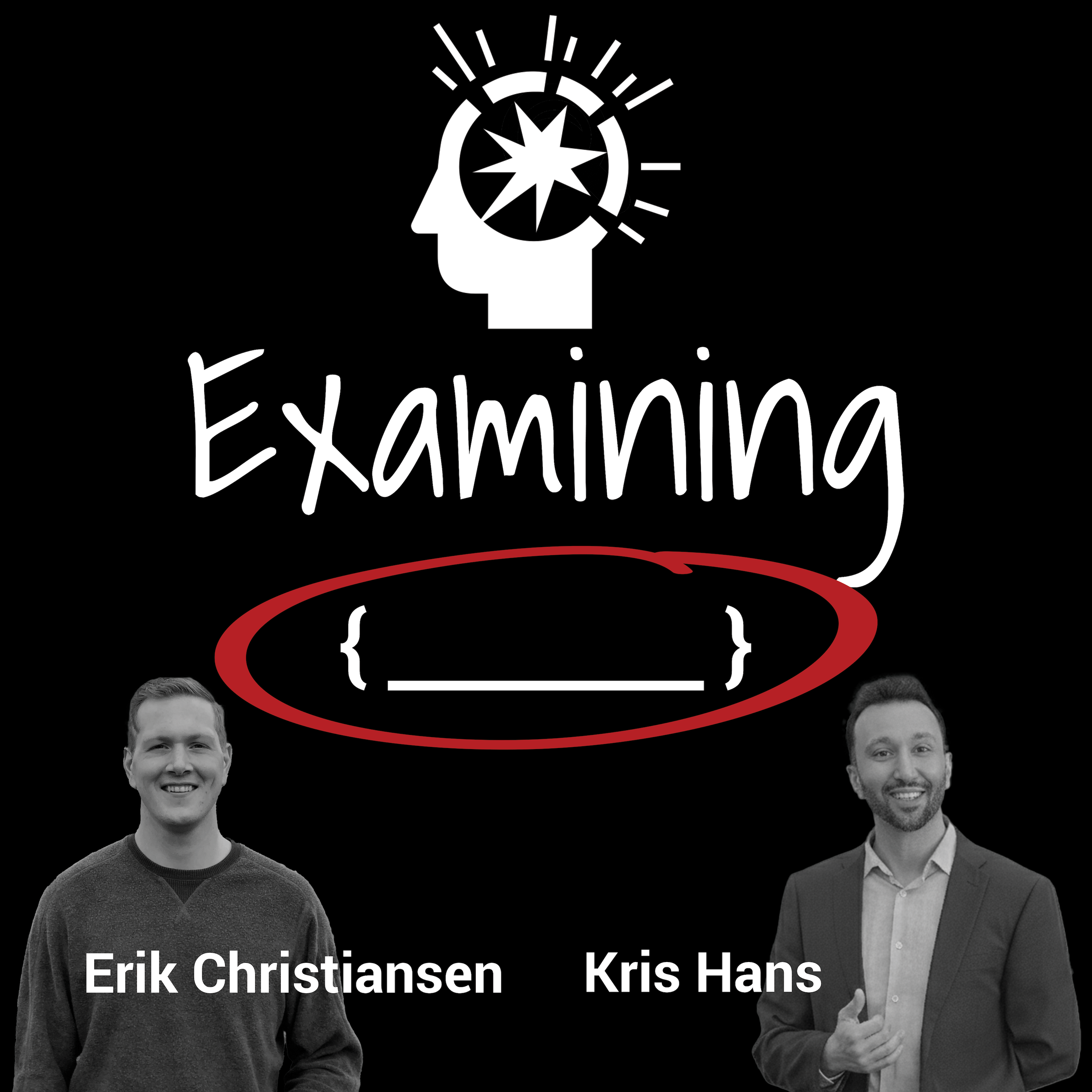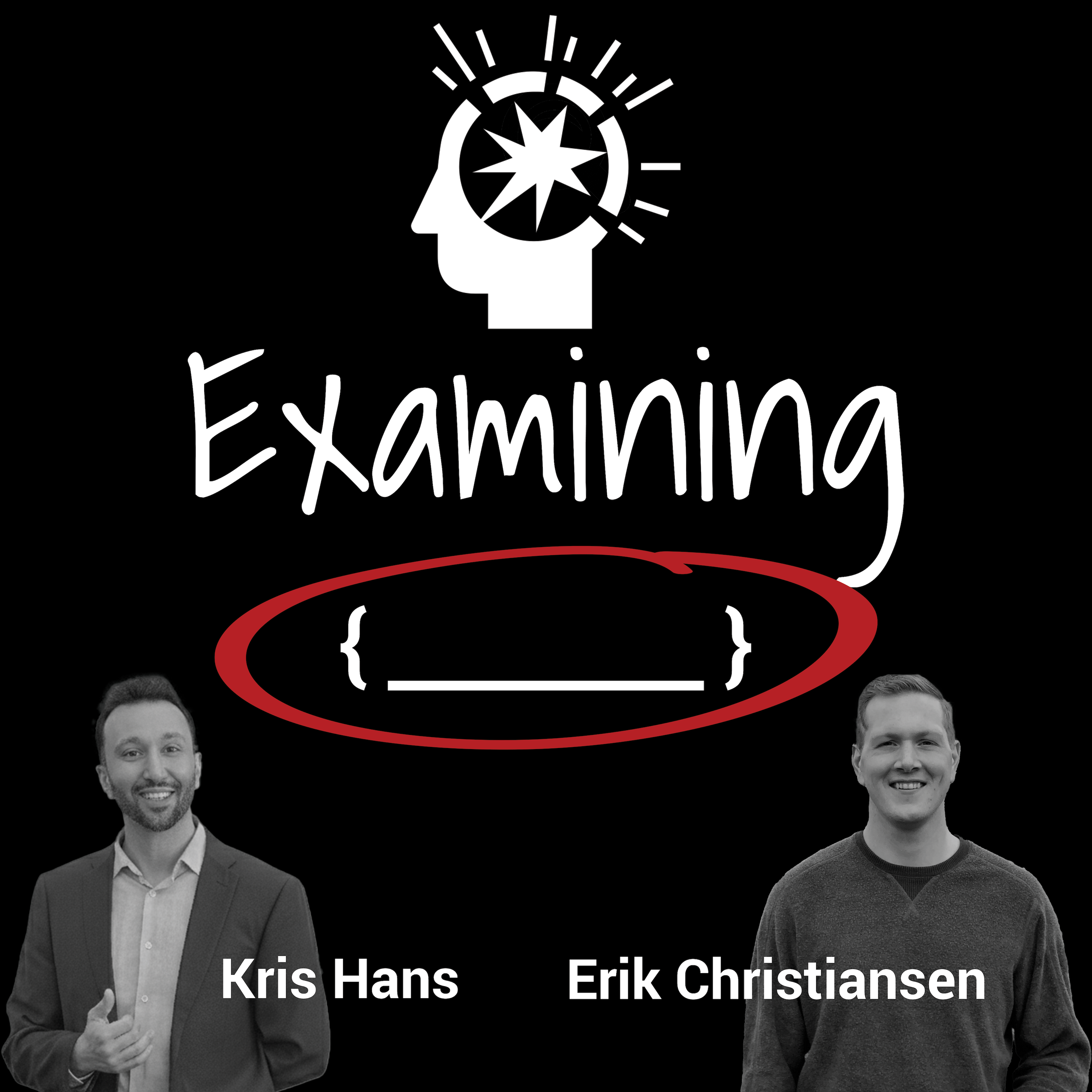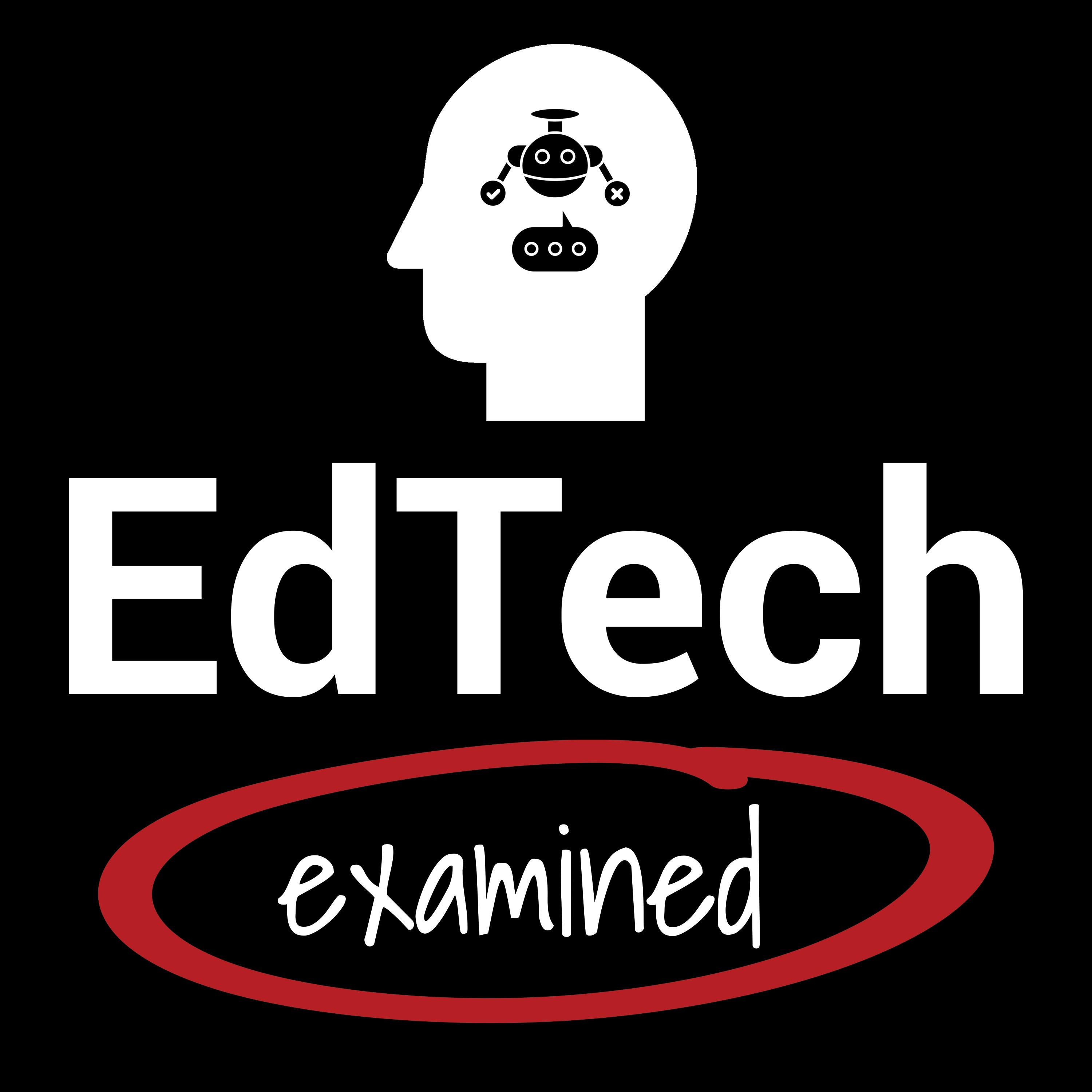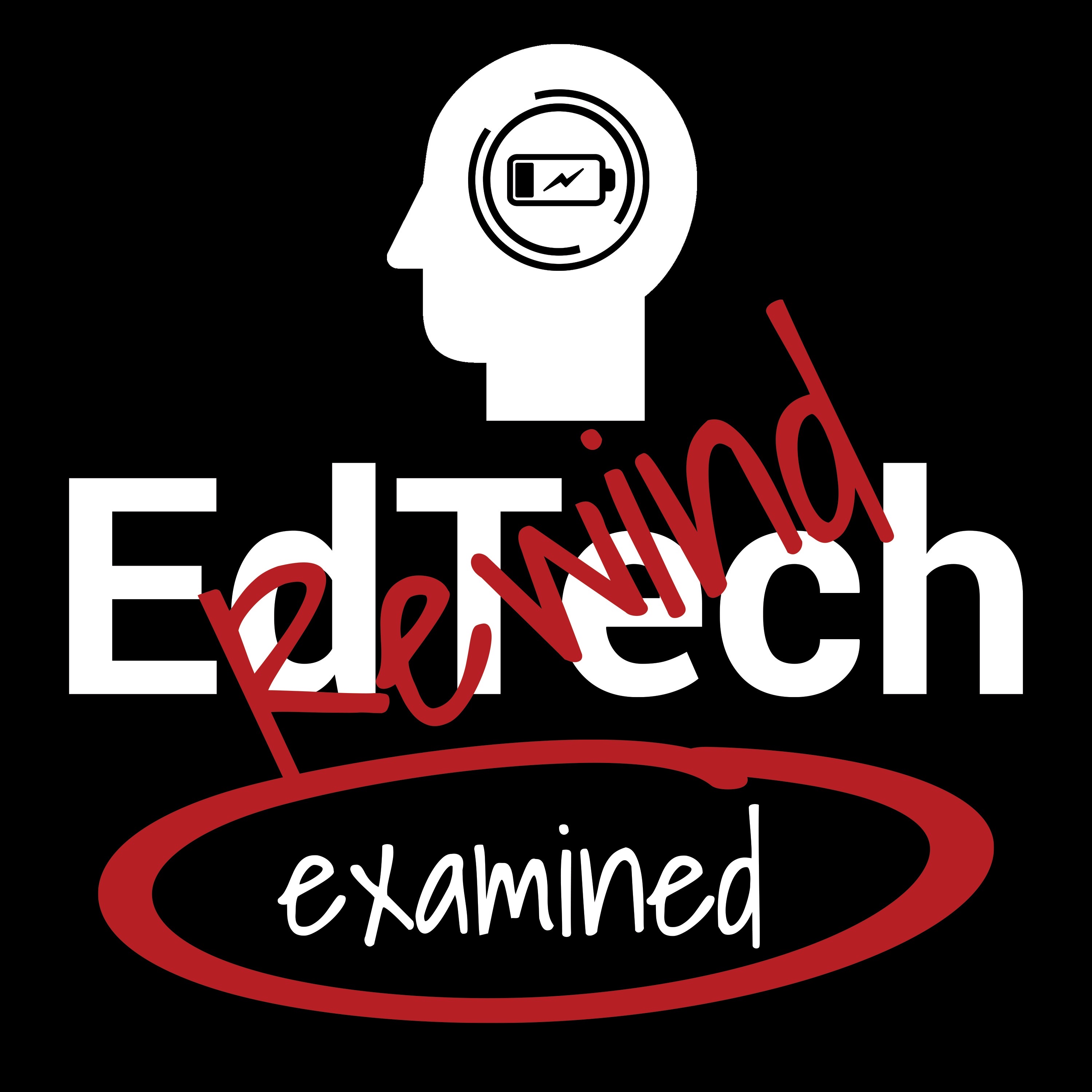Episode Transcript
[00:00:08] Speaker A: Welcome to EdTech examine, a series about educational technology and what you need to know. I'm Chris Hans.
[00:00:15] Speaker B: And I'm Eric Christiansen.
Well, welcome to another episode of EdTech examined.
I hope our listeners are doing well wherever you are, whatever time of day you're listening to.
Chris, how are you doing on this now Sunday afternoon?
[00:00:37] Speaker A: Going well. It was raining a little bit, but now it looks like the sun's coming out. So it's always nice.
[00:00:46] Speaker B: We started a little late. We had a bit of a keyboard fiasco. Apparently removing Bluetooth devices on a Mac and re adding them using the Logitech software is not as easy as we anticipated.
[00:00:59] Speaker A: Literally, we were troubleshooting and doing edtech Examine diagnosis. Maybe that should be our side hustle is tech support.
[00:01:11] Speaker B: That's right.
We're going to try something different.
For those listeners who are familiar with this podcast.
We originally advertised this as monthly and then would try to put in mid month episodes where appropriate. So monthly is always consistent. So we are still adhering to the original plan. We're going to have continue to have episodes on the first Tuesday of every month and we're also going to try to continue to have episodes on the third Tuesday of every month.
So that date will vary from year to year. But we're going to change up the structure of the mid month episodes a little bit. So we have multiple sections in our first Tuesday of the other month episode. Those typically are longer episodes.
Some folks have told us that we wish we did shorter podcasts. Some people say they like the longer podcasts. And the data suggests that the length of the podcast makes no difference to how many downloads we get. In fact, one of our longest episodes is still by far and away the most downloaded. Chris, I think we're almost at 1700 downloads for episode nine, capture, configure, control. So our compromise is that we have for the last little while been including chapter markers in our podcasts. So I've been putting these chapter markers in so you can skim to the sections that are most relevant to you in the longer episodes. But we're going to try some shorter episodes for mid month. So we're going to scrap our regular segments for the mid month episodes and just focus on kind of one item of discussion, one tech tool, one topic relevant to educators.
And we're going to try to keep it short.
That makes it more manageable for us. And also we could then have a hybrid system.
We'll also still include interviews, of course, mid month where appropriate or wherever.
I think we are going to Start with a short discussion about a book that Chris is reading that I read not long ago.
Did you want to introduce it for us, Chris?
[00:03:32] Speaker A: Yeah. So it's.
We're actually kind of basing this off of the most downloaded episode, which was the Capture Control Configure where we discussed Cal Newport. He's a Georgetown computer science Prof.
And he's written a number of books. And over this past year, I've actually listened to three of his books, and this is my fourth one.
Seems like each one kind of builds upon the next, which kind of makes sense.
But this is called A World Without Email.
And I mean, it was kind of interesting read, and hopefully we'll see what we are. It's almost like doing a book review of this, but maybe to kick it off. One thing that I found kind of interesting is how Newport went through in some ways. I mean, I kind of appreciate it, but I don't know who his audience is and. And what have you, but takes a very academic approach to this, where he discusses the full history. And I found it kind of fascinating, like, how did we arrive at this state of affairs where we're all inundated by email and it's controlling our lives? And he even talked about, like, the pneumatic tubing that the government. I believe it was the CIA that he was referring to, that they would go and share messages and it was like a game changer. But then later on, this thing called the World Wide Web and electronic mail and so on came up, and they can justify the costs. What are your thoughts?
[00:05:12] Speaker B: Yes. Well, so he kind of. It's been a little while since I've looked at it more recently than I have. So when I read about it, what sticks out to me was that he talks about the advent of asynchronous communication.
So synchronous communication would be.
Morse code is more or less synchronous communication. The telephone is the best example of synchronous communication because it's live. What we're doing here, over zoom, is synchronous communication. I think if I can read between the lines on his book, that he feels that synchronous communication is largely more efficient, at least in terms of discussions and taking away things. Now, I guess we have a discussion about meetings and how valuable meetings are or aren't depending on on the context. But one of the things he talks about is asynchronous communication. And again, this is me reading between the lines on his book can be very useful for composing long messages, but it's Also abused.
And it can be a way to kind of offload our brains onto other people. So I think it was in his book Deep Work that he talked about one of the issues with email was that there are people who spend all day answering emails from people who've sent them because they didn't want to figure something out on their own.
They'll often end those emails with thoughts. Question mark was what I remembered.
You may spend an hour and a half responding to somebody who's asked a very broad question and ended their email with thoughts question mark.
And so that they've. Rather than them having to go look for the answer, they've inadvertently recruited you to do a bunch of work for them and basically draft something over email. So I'm not sure how to. Here's a good example. I think I'm not sure how to approach this report. What are your thoughts? Question mark? Well, here's how I would approach it. And then they outline a draft, they copy and paste that, and they expand on it. So email is a sneaky, asynchronous way to where we offload our responsibilities.
The mental struggle that we would typically have to go through onto somebody else.
[00:07:41] Speaker A: Yeah.
[00:07:41] Speaker B: And I mean, at least that's how I.
[00:07:44] Speaker A: It's kind of like a. Again, maybe it's because it's been a while for YouTube, but. And it's in my head recently. But for example, one of the things that he mentioned was if you're in the office and somebody, you go to somebody's desk to ask them a question.
In the past, like prior to email, you would maybe leave them a sticky note and then you would wait until you hear back from them. And so in some respects, like whether you are talking about the asynchronous versus synchronous type of communication, I think what he's kind of arguing more for is that you got to go and change your processes overall. Right. And in terms of from a planning perspective, because email in itself isn't necessarily a bad thing. It's just the way that it's being used. And in the past, like he refers to, for example, Tim Ferriss who came out with the four hour workweek and he actually created this away message, like an auto response where he talked about how he needs uninterrupted time. And so he may not get back to you for X amount of period of time. Not to be upset, but just that in itself a lot of people took it the wrong way. And it actually kind of maybe even from a change management standpoint and just Human behavior and stuff, maybe even annoyed individuals. And so one of the things that I found kind of interesting is that Newport talked about don't tell anybody about what your processes are. Just go and get the stuff done.
And you know, I think that especially with that, his previous book, with the deep work, where you do need large chunks of uninterrupted time, I think it's really useful. But right now, what he describes, there's that hyperactive hive mind that we're all tapped into. And so even beyond email now you have instant messaging applications like Slack, where you're just expected to tap into this hive mind and drop everything. And so again, it becomes that issue of can you go and be proactive or are you being reactive to everybody going and dropping by?
[00:10:02] Speaker B: That's a much better way to put it.
For those people who are not familiar with his work and we've talked about him a number of times. Deep work, the idea being that you need a large span of uninterrupted time to work on one thing deeply multitasking is bad. Context switching is bad because it takes a while to get into something. So if you work on something for 20 minutes and then you're never really focused if you do that right. So the deep work approach is an individualistic, your responsibility approach. Chris, I don't know if I think you would agree. That's kind of how I see it. It's like this is what you can do as an individual to try to maximize as much deep work is as appropriate for your particular job. And he's very clear that if you're a secretary and your job is to react well, then maybe a very small minority of your time is deep work. But that's okay because your job is a lot of. He calls it shallow work. He doesn't mean that to be degrading. It just means that you're switching between non deep things. And if you're a support person where a CEO depends on you, that's, that's super valuable. So he's not saying that deep work is necessarily better, just that without deep work, it's difficult to come up with innovations and concentrate. So if you're a student or a faculty member and you're writing a lot of papers and you're trying to do assignments, you need a lot of deep work time to be able to produce new and original ideas, because that's the whole purpose of being a student or an academic. It's to the end product or ideas. I got the impression that with his book A World Without Email.
He summarizes deep work and the individual responsible approaches you can take, but ultimately says that only goes so far.
You can set no expectations, you can have autoresponders, you can do everything you want. But if you work in an organization that's obsessed with what you aptly described as the universal or that, what is it, the hive mind? The hyperactive? Is it the hyperactive hive mind?
[00:11:59] Speaker A: The hyperactive.
[00:12:02] Speaker B: If your whole workforce and your whole organization is this reactive, hyperactive hive mind, there's very little that you can do to kind of bend the curve in terms of putting boundaries in place. So he says that that works to an extent, but I feel that this is almost him admitting the deep work. Yeah, he came up with that as an academic in a position where he can tell people to leave him alone and what are they going to do? But if you're at a company where you don'. Have the power to change that, or you're a non tenured academic, or you're in some labor situation where you can't really make a demand like that, then it has to come from the top down. Or there has to be some sort of institutional understanding that not answering something right away is okay.
[00:12:48] Speaker A: Yeah, yeah, exactly. And then what that comes down to is it's a change of process. Right. I mean, he's not saying that email is necessarily a bad thing. It's just the advent of email has become something where.
Especially in the first part of his book where he's talking about how, you know, how did we get here?
It's interesting because this was new technology, pneumatic tubing and all this, like, it's expensive. I love that. And so then how do we go and be able to communicate with people quickly and efficiently?
Email came about and now what's happened is essentially it's become busy work. Right. Like, it's. It's kind of your way of showing that you're doing work. But overall, most people. And he talked about how he did some surveys of people where they feel like they're drowning in email. And, you know, there's a. There's kind of a feeling of misery and this tyranny associated with the inbox and so on. Right. And I mean, I look at it like the. Not this past week, the previous week, I actually had two days where I was involved in a strategic retreat. So I didn't have time to go and respond to emails. But the emails still came. You know, we're coming in, they're flowing in, and I'm still catching up from that. Right. And, and I know every semester it's funny because it's, it's like you're saying, Eric, like instead of people trying to figure out for themselves what they'll do is easier for them to just email.
Right. And then offload that responsibility. And I, I don't know, I mean, it may be even something like that where you kind of have to look at developing some of the processes. But I mean, with all the various communication tools and it's getting kind of out of hand when you look at, between, let's say if you're using Outlook or Gmail, then maybe you have some instant messaging things like WhatsApp, Slack teams, Messenger, now you got this video conferencing with Google Meets Zoom and so on. Like, it's, it's just taking, it's. Not only is it distracting us, but it's actually being detrimental to our cognitive abilities and ultimately even just having like those smartphones with you all the time, like you're actually working more. I mean, there was this one person that he actually referred to where they changed their whole philosophy and actually changed their work week where the average worker was basically only spending five hours a day. So in 20 hours they were actually getting more stuff down. And it was interesting in the sense that by creating those constraints, by having people meet less and focus in on that deep work. And this is really what's happened is, and this is why I think maybe as much as I say it's like an academic exercise, by even understanding that going from the industrial age, looking at the assembly line, what, what we're kind of taking those same type of processes and thinking, okay, well, if we have email as a tool, it's just a matter of let's get this done faster, more efficiently, but in the meantime, people are spending maybe hours reacting to their email. They don't get concentrated time. And as much as everybody says that you can multitask, you can't. It takes time to get back into the rhythm of things.
And I'm sure you, I think you're in agreement to that.
[00:16:12] Speaker B: Yeah, I mean, I would say a couple of things about his book. So there's, I think what he's referring to with email and a lot of digital technologies is that the expectations in society around how people respond and how quickly have changed. So with email, I'll give you a couple of examples. So there was a time I've always had email when I've been in the workforce. I don't know, a time without email. But even in the time that I'VE been in the workforce, the culture around email has changed, I think quite dramatically. I'll give you an example. I was working on a project recently.
[00:16:51] Speaker A: I have a deadline.
[00:16:53] Speaker B: I said I will have my portion who you at? You know, the day before your deadline, they wanted, I don't know what date in September. I was like, I can make it happen the day before that. I will put it in my calendar. You will hear from me on that day. I will have this done.
They had emailed me two weeks prior with a big request. It's a very tedious task, but I can do it. In between the ask and the deadline, I got at least two follow ups asking me if I had started on the work.
Now that's very interesting because in previous times if you had never responded to the communication, maybe you would expect that. Hey, did you get my email?
Are you going to be able to deliver on this?
But I had already agreed.
My thinking is that don't follow up with me unless I miss that deadline.
Because I've actually made a deadline the day before it's due. You could send me if I didn't make it, I could still have it done for the next day and then you would be justified to send a panic email. But you have to trust people that you've worked with, especially for a long time to deliver on when they're going to say and if they know they're not going to be able to deliver, it's their responsibility to follow up before the agreed upon deadline and then to give a reason and then you work something out. That's how things I think are supposed to work. But I notice now I get that, hey, I'm waiting for a response because I expect a response quickly.
This is what it seems like to me. Can you give me an update?
Now I have to give an update on where I am in addition to finishing on this deadline. That's one example of an expectation of almost updates along the way. I also noticed this with mobile phones. In the days when it was landline, you left a message and they get back to you when they're at home. Maybe they're out all day. There's nothing you can do about it now. The expectation is that you would call them back immediately and respond regardless of where you are because your voicemail or texts are with you all the time.
I think that's interruptive. That's why spouses fight. Because somebody's responding to work phone calls while they're supposed to be family, beach day or something like that.
There is a strange expectation that he talks about.
People are stressed, they're afraid that if they don't respond they'll get in trouble or they seem like they're inattentive or there's this perception that they're not working.
He's like, sometimes there's no way around that. Especially if a part of your job is to provide updates and it really depends on your position. But ultimately if your job is to produce a specific deliverable and answering email makes that impossible, then that's going to be worse than not responding well.
[00:19:44] Speaker A: And that's where I think really what it comes down to is it's a matter of transforming our workflow. Right. And this is where he starts talking about and actually looking at some companies where they've started looking at the production process, developing that mindset of doing one thing at a time.
Even with certain companies, especially in the software development industry where they're implementing agile development and there's various techniques in agile, there's the Scrum where you're doing these little short burst sprints and then there's Kanban where you're doing different phases. But many of the tools that you have, they're actually using these.
It's kind of interesting because you're using things like Trello or what have you that have cards and columns and task boards.
I mean this is nothing new. If you look at the healthcare industry and he does discuss this a bit in a hospital, if you have, let's say the ICU unit, you'll have one board where you have all the patients and where their respective levels are. And at a glance you can see where everybody's at. But it's just again just changing that trans. It's like transferring that email into these boards. So it's almost like having a discussion board like these card conversations. So you'll have a card about that project. So all that communication is in one place if I need to go. And let's say in your situation, Eric, you talked about that report, maybe we have a card for that report, all the links, you know, let's say if it's a Dropbox or a Google Drive or what have you, everything will be in one place.
You can refer to it, even any kind of discussion, you can see everything in there. And, and then it's just a matter of even, you know, I think it's actually maybe a good thing to have a short meeting, discuss where everybody's at, what do people need have everything self contained in those cards. And even just from a psychological perspective, he mentioned that maybe you have certain columns when things are done and you move one card into that done just that instant satisfaction that a task has been completed or a project has been completed, but really at the end of it, the tool itself isn't a bad thing. But now what's happened is again, as we've mentioned and even in our personal lives, I mean we haven't even talked about.
It's funny, you look at things like text message and some of these messaging apps where it actually you can go and enable where the person who's sending you can actually send a read receipt and imagine you go and read it and then you got to go and do something. It can actually lead to even further stress and anxiety people. And so again, we've basically created this situation ourselves.
Unfortunately going and telling everybody, hey, I'm like in your case, how you mentioned, well I'm going to get it done by this point or what have you really. I guess it depends on the workplace culture and you know that feel for working with that individual. But I agree with you, Eric. As long as you haven't missed any deadline and you have no history of missing the deadlines, nobody should be interrupting you until unless they need something or if you needed something from that.
[00:23:09] Speaker B: Yeah, exactly. And I appreciate that. If it's a stress inducing thing, people kind of want an update halfway through and there's nothing wrong with that. And that has to be agreed on. That's a little bit easier to solve if it's someone asking you in your organization. In this case it was outside of the organization.
So we don't have a system set up between organizations. So I think that the solution to this is like you said, if you have a repository and this is what it used to do with Microsoft SharePoint, you would put in all the knowledge base resources, you know, links like you said, things that people need to refer to all the time. On your homepage you'd have different sections for each project and it doesn't take very long to check things off a to do list or to document a little bit of what you're doing as you're doing it. I think documentation as you're working can become just as much of a burden as the project itself if you do it in too much detail. But if people are documenting the projects, they're putting it at a central place where everyone can see it.
There's a, you have accountability and B, anybody can go and see where people are at. Like you said. Right. There's not a need for you to write a communication that summarizes what is already in a location for everybody to check. That's crazy. That's duplicated work. Right. So I think, yeah, his solution is to have systems where you can do that and have a culture.
Yeah. So I don't know that that's easy to solve.
[00:24:42] Speaker A: No. And that's the thing, right? Like, I mean, imagine, Eric, if you. I mean, we've chatted about this before. Probably the best thing is maybe checking your email twice a day. But if I go and advertise it to everybody, hey, I'm only going to be checking my email twice a day. Maybe in the morning and then one in the afternoon.
People may get a little bit ticked off or what have you.
And that's why it was interesting because he did mention that maybe you don't disclose what your work habits are as long as you get everything done and don't even apologize for it either. Just go and do it until you get to a point where somebody starts complaining. But that's where I think it was interesting.
Even with meetings, sometimes people just meet for the sake of meetings. And one thing that he also mentioned is like, let's say, Eric, like in we're working together where this whole podcast we've been doing remotely. Right. But what we could do is create like a bunch of things that tasks things that we need to go and address, compile them, and then we get together and we discuss them all in one batch as opposed to going and, you know, constantly interrupting each other like throughout the week. And so again, it just becomes a matter of changing your process. You're, you know, he does also refer to. I mean, there's this concept of like attention capital he mentions in the book and really emails taking a lot of our attention and it's leaving people and not only feeling anxious and not productive, but then they wonder, yeah, what. What have I completed in a day? Because it seems like all we're doing.
[00:26:20] Speaker B: Is scrapes the meaning from their life.
[00:26:23] Speaker A: And in fact, actually what's happening is we're working longer.
And I don't think if you look at again back, and this is why I think you went through the history, it was more so just to get things done really fast. Right. If you're in a production line, you're trying to go and build a car or what have you, but you can't go and apply those same type of principles to knowledge work.
I mean, there's certain things that maybe you can kind of take into effect, but it's at the end of it. This is a, you know, I think just getting in that right zone and this is why it's, I think it's important as well. One thing actually recently I've seen like Adam Grant who you know, sometimes Newport talks about him as well and he's a professor at Wharton in psychology. But this past year and a half people are getting really exhausted with the video conferencing that zoom fatigue as they refer to it. And it's okay, maybe you don't need to have your camera on while you're having a meeting and while people say that you should have it on and be present at the same time. I mean maybe as long as you're paying attention and you could be doing other things, who knows what people are dealing with. I mean having taught in an online environment in this past year and even I've just had some sessions already this, this past week, most people don't turn on their webcam. So I'm not going to take it out against anybody. I don't know what their personal situation is.
It does suck going and talking into cyberspace. Right. But at the end of the day as, I mean I'm happy to go and have a conversation by myself I guess into this void.
[00:28:06] Speaker B: I do that all the time.
[00:28:07] Speaker A: Exactly.
So but you know, it's I, I don't know, I find whether you agree with Cal Newport or not, I think it's something that you can enjoy. I again, maybe it's because I'm in into like I understand the software side of things.
Even just the, the academic history that he's gone through. I found it kind of interesting too. He even refers to philosophy. He refers to the law Leviathan with Thomas Hobbes and where he talks about the life of nasty, brutish and short. And that's kind of what the state of affairs were in with email. But it's interesting his approach. I think this is why sometimes I discuss this with you. Like for some people maybe this is where that value proposition for a service like Blinkist comes into play where they just want to get to the heart of it. And what the heart of it is is that you need to find a way within your organization to change the workflow of the processes so that you can maybe cut back on emails and not have it as something that. And some of the companies that he discusses in the books, like they literally don't use email very much anymore.
It's mostly self contained within their project management software, whether it's Asana or Trello or what have you.
[00:29:29] Speaker B: So what can we recommend to students or educators to reduce some of the burden of email other than the expectations and just being diligent. And we can't train people for that. But what would the best tool be?
[00:29:42] Speaker A: Well, it's interesting, like some of those things, let's say within a teaching perspective. And this is one thing that I'm bringing into the class, even though some of the classes are in person, but having a discussion board right now, I've created a discussion board where if there are certain questions, maybe there's other people in the class that have those same questions. But, you know, you can pose that question on the discussion board and then everybody can go and see it there. And then I create another section where it's just, you know, maybe there's some resources that whether I came across it or some students come across that they can just go and share and have it available for everybody.
I think quite often what happens is that it's, it's funny because people, instead of trying, like how you're saying, like, instead of trying to figure it out for themselves, the. It's just that much easier, hey, let's email them and find out, right? And as opposed to trying to investigate, like, it's, as you know, I think was it episode five that we had where we interviewed Tom O' Neill with i2Pmetrics. So I've been using ITP metrics in all of my courses and one of the things that I found it's kind of funny is that their system, a lot of times when the emails get issued out end up in the junk or spam folder.
So now what I've done is just added when I send out an announcement to students is that in the event that you don't get something from ITP Metrics, check your spam or junk folder before you contact me. But like, that's, it's, it's funny. It's just simple things like that that you just need to be a little bit more aware of. Like put yourself in the shoes of both, you know, your instructor or professor as well as the students, you know, and even it's. I'll tell you, this past week, like, normally what I would do is actually go through in detail on the first day of class, all the various assignments and so on.
And this year I decided not to.
I just went over it quickly because I'm going to have to repeat it anyways. And I don't know if it's the best use of our first day of class.
And again, all the information's there is just, I think sometimes People are lazy to go and actually read.
It's funny, I had somebody, one of my colleagues, I don't know, I get labeled as being a professor or something by them, like, are you giving me homework? And I'm like, well, contrary to what you might believe, even though you're not in school anymore, you still have to read after school.
And maybe you should even read more so to keep up to date, whether it's reading books or reading articles or whatever. But it's just, I think it's human nature. We think that, okay, well, we only needed to read while we were in school and now it's done and, you know, let's let those textbooks catch all that dust and stuff. But, you know, I think this is where one thing that I think everybody should be of the mindset is that we're, we're always learning, right? That's, that's what our life is about is, you know, you're always in a constant state of where we're like lifelong students.
And so, you know, you always have to kind of adapt. And I think that would be my kind of approach. Anyways. One of the things that I'm, I'm thinking is just how do you go and have maybe a bit of this hybrid, take some of the best of what we did in online delivery and implemented it even in the classroom?
[00:33:18] Speaker B: Well, I think that's a good summary, Chris, of this work. And I think this book would apply well to educators in higher education and K to 12, both instructors and students. Those are areas where we have a lot of flexibility and autonomy. So these are good places to apply the skills of deep work and creating some boundaries around digital communication just once again. That book is called A World Without Email Reimagining Work in an Age of Communication Overload.
That was published by Cal Newport in 2021.
Thanks a lot, Chris.
[00:34:00] Speaker A: Awesome. Than.
[00:34:08] Speaker B: You can learn more about EdTech examined by going to our website edtechexamined.com there you'll find ways to subscribe as well as host information, our social media accounts and our blog posts.
Our blog posts are also published through medium on the EdTech Examined publication.
You can contact EdTech Examined by emailing us at. Hey, edtechexamine.com if you have an EdTech question you'd like us to answer on a future episode, you can email us or reach us through Twitter using the hashtag edtechofficehours.
You can find edtech examined on Twitter and Instagram with the handle techexamined. And we also have a LinkedIn page you can follow.
Until next time. Sa.
